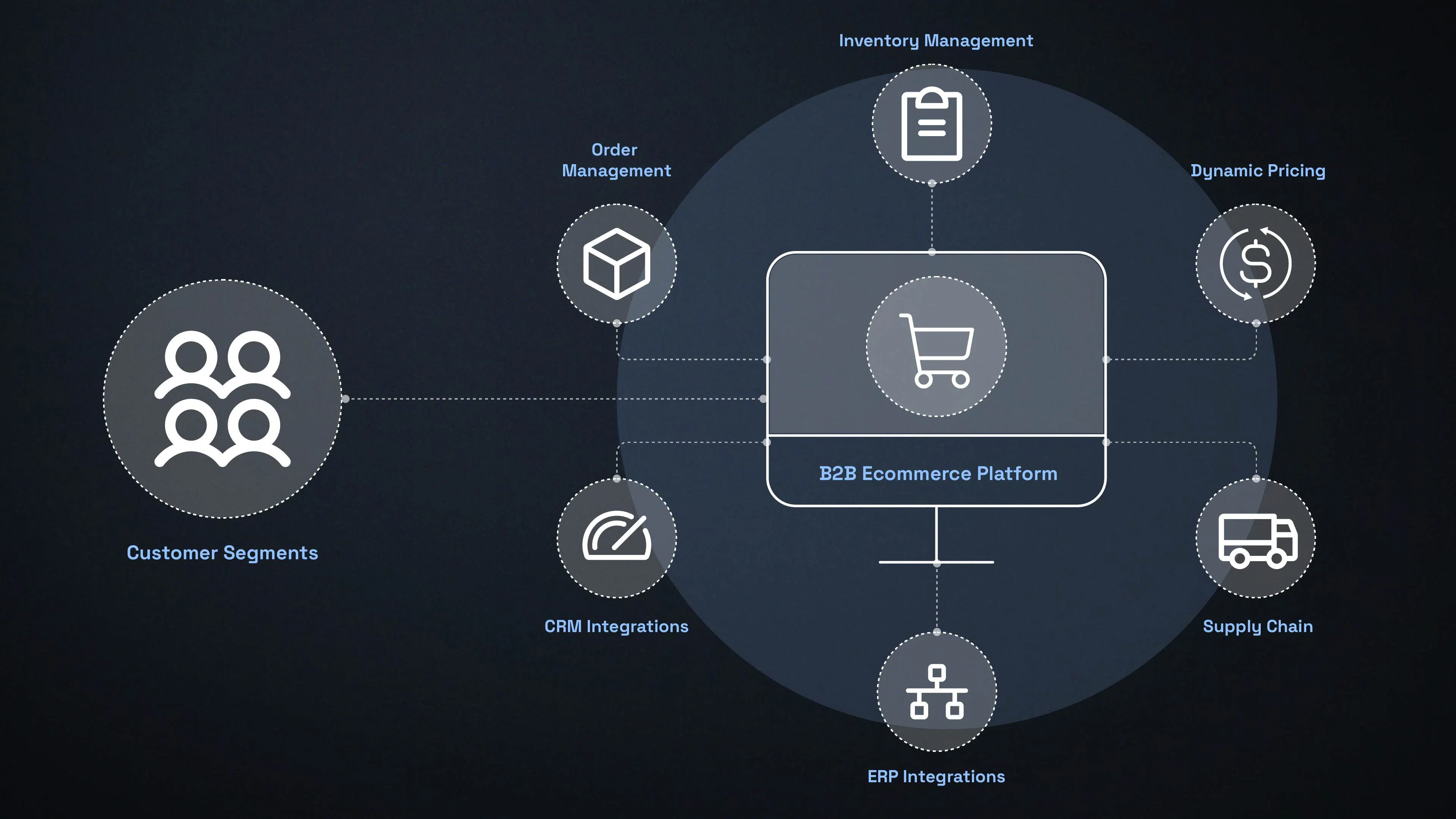How to Scale a B2B Ecommerce Platform
Strategies and Steps for Growing Your B2B Online Business

By Foster Commerce
Jul 4, 2025

Scaling a B2B ecommerce platform means more than increasing order capacity. It's about building a digital infrastructure that supports long-term growth, complex customer demands, and global opportunities. If you're looking for guidance on how to scale a B2B ecommerce platform, this guide offers practical steps tailored to manufacturers, distributors, and wholesalers navigating the shift to smarter, more flexible online operations.
Understanding the Unique Needs of B2B Ecommerce Platform Growth
Success in B2B ecommerce depends on aligning technology with real business workflows. Custom pricing, multi-layered approvals, and contract terms are just a few examples of the complexity that can accompany a sale. Legacy systems may hinder a company's ability to grow due to factors such as fragmented product data, siloed systems, and varied customer requirements, making work more challenging for employees.
A modern, scalable B2B platform should offer:
Support for quoting workflows and custom catalogs
B2B buyers often require formal quotes before making a purchase, especially for high-volume or specialized orders. Custom catalogs ensure that each client sees only the products, pricing, and terms relevant to their business.Flexible pricing tools for account-based deals
Standard pricing doesn't reflect the complexity of B2B relationships. Tools that support account-specific pricing enable the efficient management of volume discounts, contract terms, and negotiated rates at scale.Integrations with ERP, CRM, and logistics platforms
B2B operations rely on the seamless flow of data between systems. Seamless integrations help eliminate manual entry, synchronize order and inventory data in real time, and provide better visibility for both customers and internal teams.
Flexible frameworks like Craft Commerce, OroCommerce, or Shopify Plus future-proof your ecommerce business. These platforms enable growth with modular tools that your development team can tailor to how your team and customers operate.
Integrating Inventory Management for Seamless Expansion
Scaling a B2B ecommerce platform is like managing a well-coordinated pit crew. You need to know exactly what's where, when it'll run out, and how fast you can get it to the finish line. That's where integrated inventory management and order management come into play. Without real-time visibility into what's on the shelves (or in a third-party warehouse), growing pains appear quickly. Think missed orders, backorders, and frustrated customers.
Modern ecommerce platforms with robust inventory management aren't just "nice to have" for B2B. They're essential, especially if you're juggling hundreds of SKUs, multiple-location warehouses, or drop shipping.
A robust system should:
Automate low-stock alerts
Automated alerts help your team reorder inventory before it runs out. This reduces the risk of stockouts and ensures smooth fulfillment.Enable real-time sync with fulfillment partners
Real-time data ensures that all warehouses and third-party logistics providers operate from the same source of truth. This minimizes communication delays and improves shipping accuracy.Reduce manual errors through integrations
Integrated tools eliminate the need for redundant data entry between systems. As a result, teams save time and avoid costly fulfillment mistakes.
As you look at global expansion and ecommerce scaling, seamless integration becomes non-negotiable. Having inventory management tools tightly linked to your ecommerce platform means you can reduce manual entry, avoid double-selling, and automate low-stock notifications or even dynamic pricing responses.
These integrations also help you give accurate lead times, which is vital when your clients are resellers relying on you to keep their shelves stocked.
At Foster Commerce, we guide manufacturers and distributors to build custom, scalable inventory management and order management processes on top of platforms like Craft Commerce, Shopify Plus, or OroCommerce. This creates a flexible foundation that grows with your B2B business, prepares you for global expansion, and keeps your ops team out of spreadsheet chaos.
Optimizing Supply Chain Processes to Support Online Growth
No B2B ecommerce growth plan succeeds without a supply chain that can keep pace. As your online business expands, fulfillment precision becomes more important, especially when delays can affect entire production schedules. A streamlined, integrated supply chain isn't just helpful; it's essential for reliability and scalability.
To support scalable operations:
Sync your store with logistics systems
Real-time data eliminates guesswork and enables your team to manage fulfillment accurately.Automate routing rules
Send orders to the most efficient warehouse or supplier to avoid delays.Reduce back orders with inventory visibility
Show accurate stock levels across channels to prevent overselling.Streamline purchase orders
Use automation to trigger restocking from third-party suppliers without manual input.Enable accurate shipping estimates
Let customers know when to expect their orders without needing to call your team.
For B2B companies managing complex logistics and high-volume orders, we design integrated systems that bring visibility and control to your entire fulfillment process, allowing your operations to scale without stress.
Leveraging Dynamic Pricing to Serve Complex Customer Segments
Dynamic pricing isn't just about fluctuating numbers on a dashboard. It's how growing B2B businesses speak directly to each customer's real-world needs. For manufacturers and distributors, it means moving beyond one-size-fits-all lists and delving into the nuanced agreements that sustain your best customer relationships.
Each customer arrives with their own negotiated rates, volumes, and contract-specific deals, often straddling more than one customer segment or business unit. That's why modern platforms need true dynamic pricing engines built for the enterprise complexity of B2B.
Dynamic pricing enables:
Account-specific pricing rules
Show each customer the rates tied to their contract or purchase history. This reinforces trust and ensures consistency with offline agreements.Tiered pricing and volume discounts
Automatically apply better rates to customers who buy in bulk. This encourages larger orders and simplifies procurement decisions.Real-time adjustments for stock levels or promotions
Use dynamic pricing to move excess inventory or react quickly to market changes. The flexibility helps you stay competitive without manual repricing.Integrated quote generation
Allow customers to request and receive quotes directly through your platform. This reduces sales team workload and speeds up the purchase process.Loyalty-based incentives
Reward high-value customers with special pricing tiers or early access to deals. This helps retain repeat buyers and deepens long-term relationships.
Tech-wise, modern platforms can integrate dynamic pricing at nearly every touchpoint, whether that's through APIs, custom logic, or leveraging plugins for complex customer rules.
The outcome? Each customer, regardless of size, order volume, or location, receives a tailored pricing experience tailored to their history and agreed-upon terms. That's how you keep complex customer segments engaged and turning into loyal, long-term customer partnerships.
Launching New Functionality and Design that Drive Customer Retention
Customer retention drives revenue in B2B ecommerce. A platform that's easy to use and reliable encourages repeat business from manufacturers, distributors, and wholesalers who count on consistent service. Adding the right features isn't just about aesthetics but about creating a seamless experience that builds trust and saves time.
To support stronger retention:
Offer self-service account tools
Provide customers with access to their order history, tracking information, and account management features without requiring them to reach out.Simplify reordering with saved carts and favorites
Make it easy for buyers to repeat routine purchases with fewer steps.Improve navigation and dashboards
Help procurement teams move quickly with clear menus and tailored content views.Ensure mobile-friendly design
Let buyers place and track orders from the field, warehouse, or office.Roll out features iteratively
Launch updates in phases and gather user feedback to refine functionality over time.
At Foster Commerce, we help clients prioritize updates that make a real difference for buyers. When design and functionality are aligned with how your customers actually work, retention becomes a natural outcome, not a struggle.
Partner with Us to Scale Smarter and Faster
Scaling your B2B ecommerce platform requires the right blend of strategy, technology, and execution. With a focus on performance, flexibility, and user experience, we partner with manufacturers, distributors, and wholesalers to build tailored platforms that support long-term growth. Whether you need custom development, ERP integrations, or tools to streamline bulk ordering, we'll help you create a site that works the way your business does.
Let's build a smarter B2B ecommerce platform together. Contact us to start a conversation about how we can support your growth with flexible, scalable B2B solutions.
*Hero image by Markus Spiske on Unsplash

